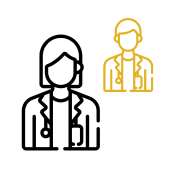Summary of the article
What is the endoscopy ?
The Endoscopy to visualize the interior of a hollow organ. Performed by a specialist doctor, it allows access to an organ for visual analysis. Introduced into the body by natural means or using small incisions the endoscope transmits images on a screen.
There are two categories of endoscopy: diagnostic endoscopy to find the causes of a disorder, and therapeutic endoscopy to treat a pathology. Find bellow the different names of endoscopy according to the organs explored :
 Arthroscopy for the exploration of the joints
Arthroscopy for the exploration of the joints Gastroscopy or upper digestive fibroscopy for the digestive system
Gastroscopy or upper digestive fibroscopy for the digestive system Laparoscopy for the exploration of the abdomen
Laparoscopy for the exploration of the abdomen Bronchoscopy for the exploration of the bronchi
Bronchoscopy for the exploration of the bronchi Colonoscopy for the exploration of the colon
Colonoscopy for the exploration of the colon Cystoscopy for the exploration of the bladder
Cystoscopy for the exploration of the bladder Hysteroscopy for the exploration of the uterus
Hysteroscopy for the exploration of the uterus
Endoscopy does not use X-rays, so it's not a radiation technique.
The device used is called an endoscope or fiberscope. It consists of a rigid or flexible tube to which a lamp and a camera are attached. There is a suitable endoscope for each organ.
How is an endoscopy performed ?
There are different categories of endoscopy, each of which requires specific treatment.
Generally, you are taken care of by the medical staff who ask you to remove your clothes, install you on the examination table and then give you an infusion.
Depending on the organ being examined and the type of examination prescribed, a local or general anaesthetic may be used. The examination is carried out under optimal conditions of safety and hygiene.
If necessary, to facilitate the movement of the medical device, air can be blown in to loosen the walls. Other accessories can also be used to allow the removal, sectioning or treatment of tissue.
The examination takes about 30 minutes to an hour. After the endoscopy, monitoring of your health may be necessary, which involves a hospital stay of between half a day and 48 hours.
Preparing for an endoscopy
When you make your appointment, remember to mention your treatments, especially if you are on anti-coagulants, as well as your medical history.
If the operation is planned to be performed under anesthesia, you will need to consult an anesthetist beforehand, at least 10 days before the examination. Other tests may be prescribed (blood tests, electrocardiogram, chest x-ray, etc.).
In the event of anxiety that is not relieved by the explanations and advice of the medical staff, the doctor may decide to administer a tranquilizer.
Most of the time you should not eat or drink or smoke for four to six hours before the examination.
On the day of the examination, please remember to present the following documents to the secretariat :
 Your health insurance card ("carte vitale") and complementary health insurance card ("mutuelle")
Your health insurance card ("carte vitale") and complementary health insurance card ("mutuelle") Your prescription
Your prescription Your previous reports and images related to the condition which will allow a comparison and a better follow-up (X-ray, ultrasound, scanner, MRI...)
Your previous reports and images related to the condition which will allow a comparison and a better follow-up (X-ray, ultrasound, scanner, MRI...) Your blood test results
Your blood test results
Image interpretation
The results will be given at the end of the review by the specialist. He or she will give you a commentary, explain what to do next and prepare a written report for you and your doctor.
What are the risks of an endoscopy ?
Complications of an endoscopic examination are exceptional, among them infections are very rare, but if any symptoms appear (pain, fever, blood loss, etc.) you should report them to the nursing staff, if you are hospitalized, or to your doctor.
General anesthesia is a potential risk. The pre-anesthetic consultation will allow it to be carried out in the best possible conditions.
Endoscopy categories
Click on the title of the examination to display the details.
Where to make the specialty : Endoscopy
-
No city




